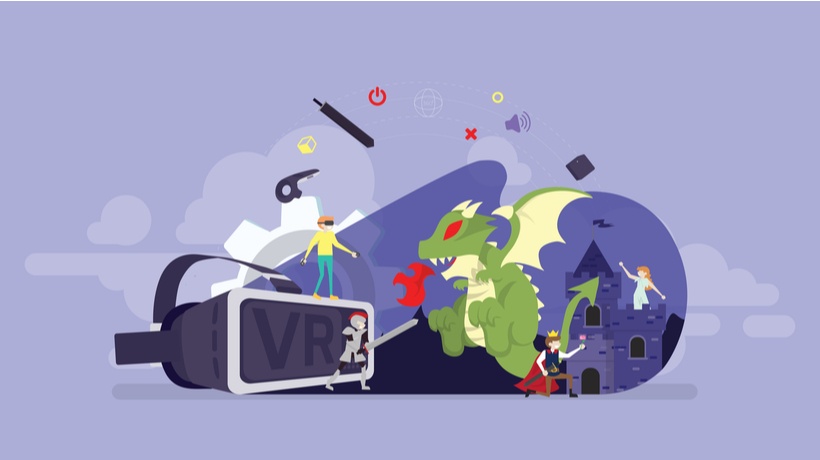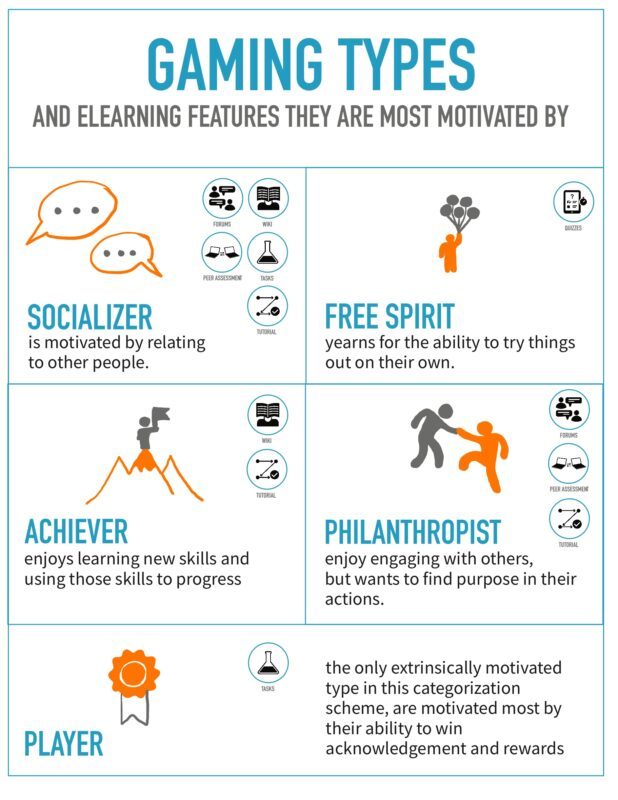
Learning Motivation And Gamer Types
Everyone has different motivations for the things they do in life. Sometimes the motivations are intrinsic and sometimes extrinsic. Can these motivations overlap across areas of life? Can someone’s motivation to play video games influence what activities motivate them to learn the most? Bovermann and Bastiens’ 2020 article “Towards a motivational design? Connecting gamification user types and online learning activities” ventured to examine this question. The researchers focused on six types of online learning activities in this study:
- Forums
These are discussion boards that learners can use to post and respond to ideas and questions. - Peer assessment
This allows learners to request feedback from and give feedback to their peers. - Quizzes
These can be used by learners to self-assess their knowledge of the topics being taught. - Task activities
Learners can work alone or with others on problems in these activities. - Tutorials
These can consist of videos for the learners to watch about the topic. - Wiki activities
These allow students to co-author and expand on online documents about the subject matter of the class.
The Five Types Of Gamers
Bovermann and Bastiens used questionnaires to see which of these learning activities correlated best with these five types of gamers:
- The Socializer
- The Free Spirit
- The Achiever
- The Philanthropist
- The Player
1. The Socializer Wants To Connect
Socializers are intrinsically motivated and most concerned with relating to other people. In the gaming world, the gamers of this type most enjoy the social aspects of gaming, such as “social discovery”, forming teams or guilds, and the social pressure to advance through the game. These gamers connected with the most number of learning activities of any gamer type, but particularly endorsed forum, peer assessment, task, tutorial, and Wiki activities.
2. The Free Spirit Wants Autonomy
Free Spirits are intrinsically motivated as well, but yearn for the ability to try things out on their own. When gaming, they prefer creative activities or activities that allow them to venture out on their own to find interesting “Easter eggs” or story options. Perhaps surprisingly, the only eLearning activity these gamers particularly endorsed was the quiz. Bovermann and Bastiens, along with previous researchers, theorize that this may be due to the fact that the quiz activity here was optional, meaning the learners could test their knowledge on their own but faced no consequences if they decided they wanted to quit the activity.
3. The Achiever Wants To Learn And Master New Skills
Achievers are intrinsically motivated by the desire for competence and, later, mastery. These gamers most enjoy learning new skills and using those skills to progress through game levels. These gamers particularly endorsed only two of the learning activities: tutorials and Wiki. Bovermann and Bastiens believe this may imply that Achievers are careful to consider exactly which activities will best lead to their personal learning objectives.
4. The Philanthropist Wants A Sense Of Purpose And A Feeling Of Altruism
Like Socializers, Philanthropists enjoy engaging with others during their gaming experiences, and both are intrinsically motivated. However, Philanthropists are more strongly motivated by their desire to find purpose in their actions while gaming. These gamers most heavily endorsed forums, peer assessment, and tutorials. Researchers believe the Philanthropists’ need for purpose and altruism may translate well to the tasks they endorsed, as they may be inspired to act in moderator or tutor roles in group-oriented activities.
5. The Player Wants To Be Acknowledged
Players, the only extrinsically motivated type in this categorization scheme, are most motivated by their ability to win acknowledgment and rewards. This type only particularly endorsed task activities, which may indicate they are more concerned with benefits to their own learning rather than collaborative learning. While Players are extrinsically motivated, researchers believe there may be ways to help them internalize their motivation. A 2018 study by Bovermann, et al. found that “incentives and rewards with game element badges can be important factors to engage and intrinsically motivate students in online learning, especially when these rewards are perceived as acknowledgment from the students’ facilitators.”
How Can We Apply This To The World Of eLearning?
Bovermann and Bastiens give some useful suggestions on how to tweak popular eLearning activities to better motivate students:
- Forums
Forums should give learners the ability both to share their ideas about the content and to provide assistance and instruction to each other. - Peer assessment
These activities should encourage collaborative learning through group work, but also through positive social pressure, such as having learners engage in friendly competition using things like leaderboards. - Quizzes
Allow quizzes to be optional activities that can be used to self-assess progress through the subject rather than discouraging the desire to “try things out.” - Tasks
Tasks should have thorough instructions and clear learning objectives outlined for learners so they can easily determine the benefits of the activity. - Wiki
Wikis should encourage collaborative learning and sharing of knowledge between learners, giving them further opportunities to learn new skills together.
Instructors know their learners best. Understanding what motivates learners is key to creating engaging and effective learning content. Using groupings such as gamer types may help instructors to understand these motivations better and to bring the best out in their learners.
